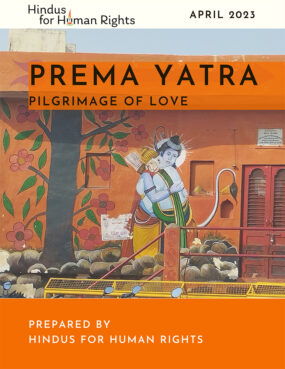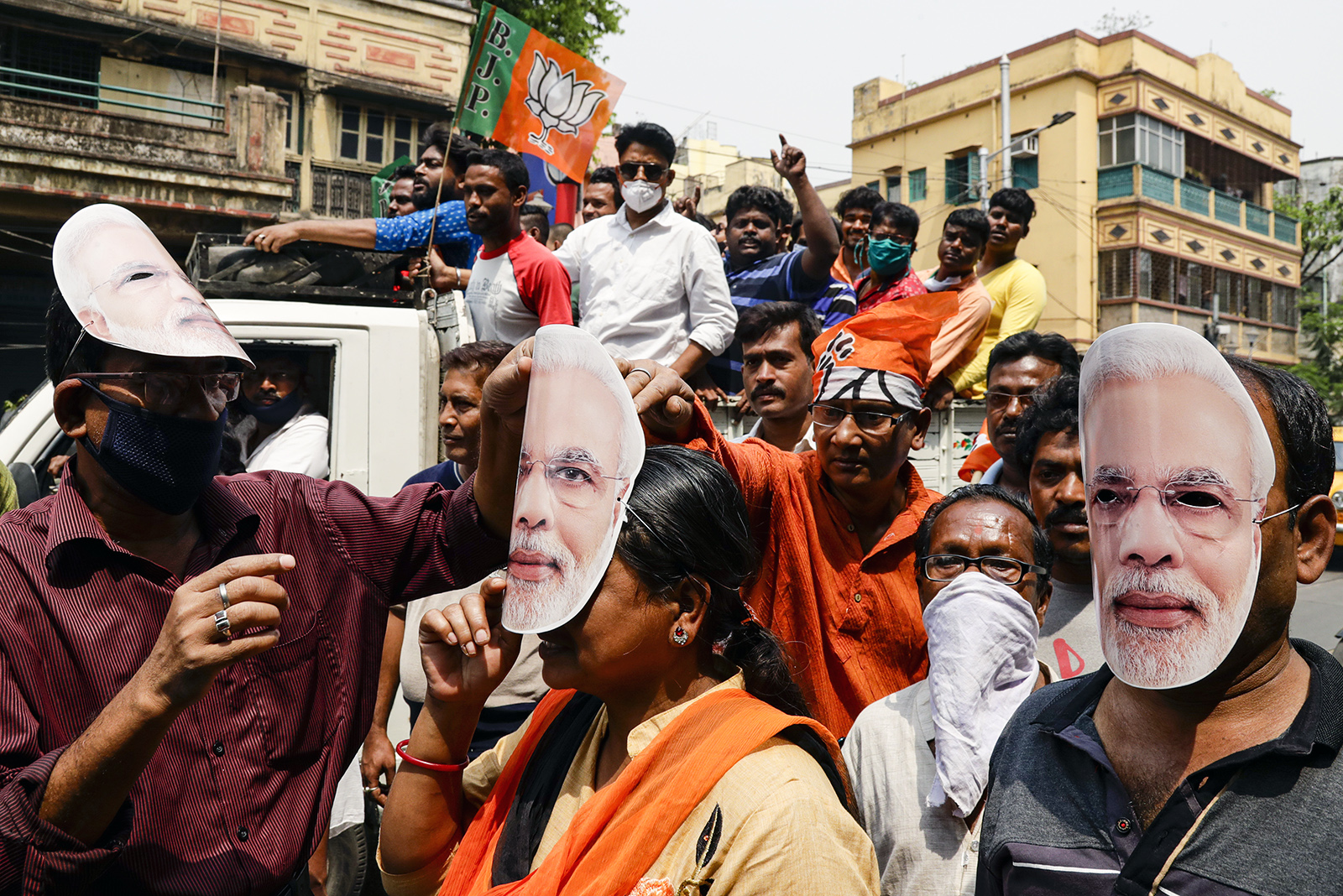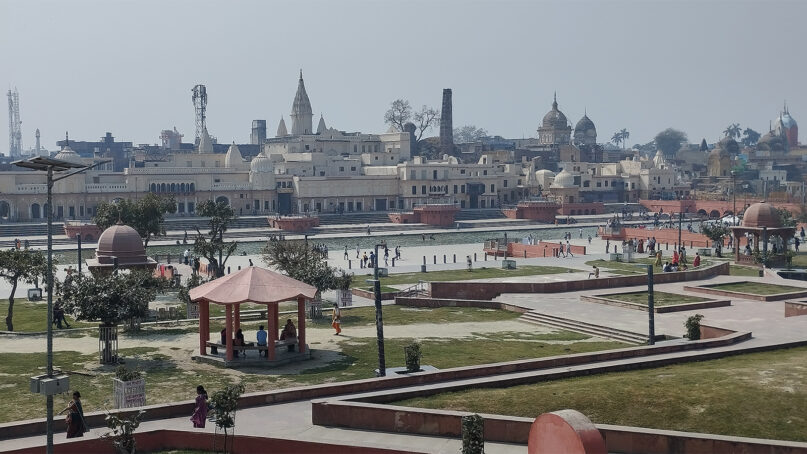(RNS) — In 2019, Anantanand Rambachan, the Hinduism scholar and co-president of Religions for Peace, wrote: “The rise of populist nationalism, and especially those versions that clothe themselves in religious colors, requires a critique from the same religious traditions.”
Throughout history, religious leaders have spoken out against hate and violence originating from their own religious traditions, sometimes risking their lives in the process.
Dietrich Bonhoeffer, a German Lutheran pastor and theologian, agitated against the Nazi regime’s takeover of his religious tradition and its persecution of Jews. He was eventually imprisoned and executed in 1945. In the 1960s, the Rev. James Reeb, a white Unitarian Universalist minister and Civil Rights activist, marched with the Rev. Martin Luther King Jr. and was murdered at the age of 38 by white racists.
In modern India, Baba Lal Das, the mahant of Ayodhya’s Ram Janmabhoomi temple and a strident opponent of Hindu nationalist groups, was mysteriously murdered in 1993. More recently, Swami Agnivesh, an outspoken critic of Hindu nationalism and caste who fought for the rights of many marginalized communities in India, was repeatedly attacked by Hindu nationalist mobs on multiple occasions.
But what about today? We at Hindus for Human Rights have often asked ourselves this question: Among India’s nearly 1 billion Hindus, where are the voices of fearless religious leaders in the mold of Bonhoeffer, Reeb, Baba Lal Das and Agnivesh?
For years, Hindu spiritual leaders such as gurus Sadhguru and Sri Sri Ravi Shankar have made bigoted anti-Muslim remarks and promoted Hindu nationalist ideology, capped by calls for a Muslim genocide two years ago at a meeting of Hindu holy men in Haridwar, India.
Last year, Hindus for Human Rights published a statement condemning Hindu nationalism and Islamophobia, signed by dozens of Hindu religious leaders and temples in the United States and across the diaspora. Very few Hindu religious leaders in India, however, agreed to endorse the statement.
Over February and March of this year, my HfHR colleague, Sunita Viswanath, and I set out to investigate this phenomenon, embarking on a “prema yatra” — a pilgrimage of love — searching for Hindu religious leaders who were concerned about the state of affairs in India today.

Courtesy image
What we found, as summarized in our newly released report, was both deeply concerning but also incredibly inspiring.
In our yatra, we traveled across nine Indian states, visiting 12 cities and several villages, where we met nearly 30 Hindu religious leaders who had been recommended to us by our partner organizations and contacts. We visited major pilgrimage sites, such as Haridwar, Varanasi and Ayodhya, as well as Delhi, Mumbai and Thiruvananthapuram.
In our conversations, we encountered a pervasive sense of victimhood or resentment among Indian Hindus, deeply intertwined with hatred toward India’s Muslim minority, and throughout our trip, we saw the extent to which Indian Muslims have been dehumanized in the minds of many Indian Hindus and their religious leaders.
One swami we met in Maharashtra, a leader of a prominent and wealthy Vaishnava sect, insisted that Indian Hindus face much more discrimination than Indian Muslims and Christians. Descriptions of Indian Muslims as insular, violent and hostile were repeated by other Hindu religious leaders. Another swami in Uttar Pradesh declared that Muslims do not know the concept of humanity (“insaniyat” in Hindi) and are intent on converting all Hindus.
Over the course of the yatra, we came face to face with Hindu nationalism in direct and unexpected ways. Meeting with a swami who was visiting Delhi, we unexpectedly found ourselves in the same room as members of the Hindu Mahasabha, the Hindu nationalist political party. After a particularly unpleasant meeting with a bigoted swami who was visiting an ashram in rural Uttar Pradesh, the ashram’s trustee, who disagreed with his views, told us that the Hindu nationalist group Rashtriya Swayamsevak Sangh has been trying to infiltrate ashrams and temples in rural communities, sending its members to spend a few days at a time to plant the seeds of polarization, to be reaped in the future.
And yet, we also found many reasons for hope. Many religious leaders across India expressed deep worry about the state of affairs in India today.
Some of these leaders grounded their opposition to Hindu nationalism in explicitly religious terms. One temple priest in Varanasi told us that his idea of dharma is inseparable from humanity (“manavta” in Hindi), which he said was the opposite of Hindu nationalism. A leader of a monastic institution (math) explained that he had been inspired by bhakti poet-saints, who spoke up for the rights of marginalized communities. One swami in Haryana simply stated to us, “India has never had only one religion. This is a pluralistic land.” Religious diversity, he said, was at the heart of what it means to be Indian.
Many Hindu religious leaders we met are concerned that Hindu nationalists are working to change or end age-old religious traditions and reshape Hindu sacred sites. In Varanasi, where Hindu pilgrims come to bathe in the sacred Ganges River, several priests and mahants we met were deeply upset by the renovations commissioned by Prime Minister Narendra Modi’s Bharatiya Janata Party government that transform Varanasi into a global tourist destination. In the ancient Hindu redoubt of Karnataka, temples have pushed back against Hindu nationalist groups who have called for Muslim vendors to be excluded from temple festivals.

In this March 20, 2021, file photo, supporters of Bharatiya Janata Party wear masks bearing the likeness of Prime Minister Narendra Modi during a campaign rally ahead of elections in West Bengal state in Kolkata, India. (AP Photo/Bikas Das, File)
We were struck by the pervasive sense of fear among the religious leaders we met, some of whom have already faced violence from Hindu nationalists. Their ashrams and temples have been vandalized and attacked, and those who have spoken out have faced accusations of being Naxalite Maoist rebels. These leaders, and others, are reluctant to put their ashrams, temples or devotees at risk by continuing to protest. They also feel a deep sense of loneliness and isolation, as they have lacked a network of like-minded peers.
Yet, some of these leaders are committed to fighting and raising their voices. One swami told us bluntly: “If I surrender to the RSS, there is no life.”
In our report, we have kept all of our contacts anonymous, but many of the leaders we met have agreed to speak up in public, with our support. We hope that our report will be read by concerned Hindus in India and across the world and that they will share the report with their families, bhajan mandalis, temple communities, ashrams and other cultural and religious spaces.
In today’s India, calls for violence against religious minorities are undoubtedly terrifying. But what is more dangerous is the near-absolute silence of the Hindu majority. Hindu nationalism may be the dominant expression of Hindu identity today, but it doesn’t have to be this way. The Hindu religious leaders we met on our prema yatra showed us that there is another path forward: grounded in shanti (peace), nyaya (justice), satya (truth) and ahimsa (non-injury).
(Nikhil Mandalaparthy is deputy executive director of Hindus for Human Rights. You can find more of his work at nikhilmandala.com and @voicesofbhakti on Instagram. The views expressed in this commentary do not necessarily reflect those of Religion News Service.)





